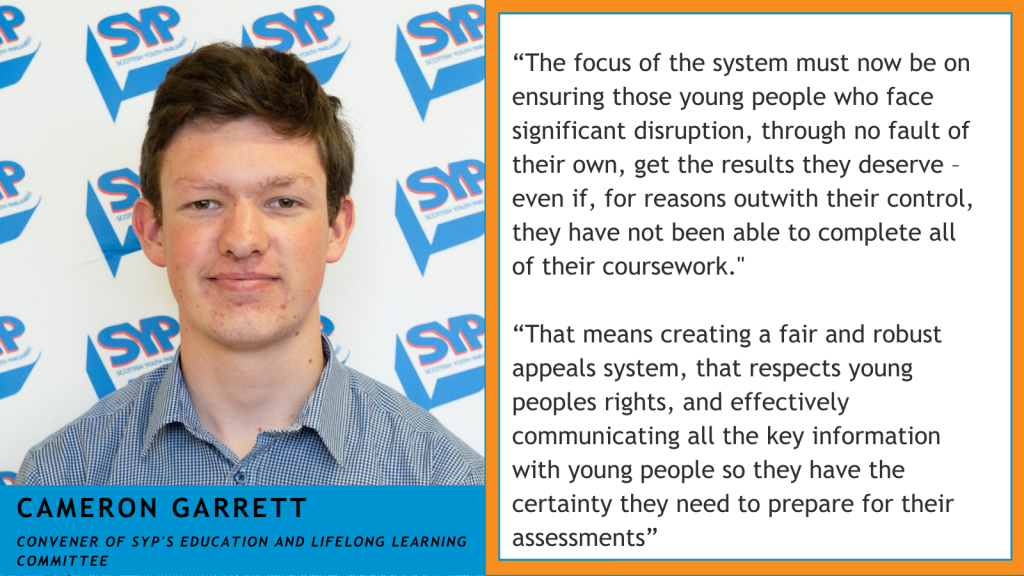Assessments in Scottish education are, for the third year in a row, taking place in a climate of uncertainty. This is affecting everyone across education including teachers, parents, education workers, youth workers, and, most importantly, young people. Young people are feeling anxious about this uncertainty – and the only solutions for that are timely and effective decision-making and clear communication by those in charge.
Since November 2020, I have been the only young person on SQA’s National Qualifications 2022 group (NQ22), representing young people’s views and opinions alongside education professionals and stakeholders. In that time, we have seen ongoing Covid-19 induced disruption hit the education system, and young people in particular, very hard. Alongside my work with the NQ22 group, MSYPs working locally, Members of SYP’s Education and Lifelong Learning Committee, SYP’s Board, and other MSYPs sitting on key education groups have been working hard to ensure young people’s rights are respected in education.
We are now in our third academic year in a row since the Covid-19 pandemic began and we are continuing to see Covid-19 related disruption gripping the system. Young people have told me that challenges they’ve faced this year include missed learning time due to both learner and teacher isolation, restrictions on classroom activities and the requirement (rightly so) for a safe teaching and learning environment. Not only has this caused students to miss out on valuable teaching time but it has affected their mental wellbeing and increased stress levels for a third consecutive year. These are the kinds of disruption that, SYP argues, must be taken into account in decision-making this year.
To help mitigate and minimise disruption, SQA have drawn up ‘Scenario 2’. The Cabinet Secretary for Education today confirmed that Scenario 2 will be used going forward. I have been calling for this for some time, and SYP welcome this announcement, which should give young people additional support around their exams and assessments to help ease the stress and confusion caused by the recent increased disruption.
That being said, there is still a lot of work to do to make sure that young people have all the information they need about their assessments, to allow them to focus on learning and preparation. Last year I wrote a blog about engaging learners in education decision making which can be found here. In that article I wrote:
‘The reality is that young people in education have felt let down and ignored over the course of the pandemic’.
Nine months on from writing that, I am worried that effective communications are still failing to reach young people and they do not yet have the certainty they need about assessments this year to reduce stress and anxiety and help them to fully prepare. If the key information is not shared with young people in a way that all understand exactly what the system is, and what is expected of them – despite the welcome announcement around Scenario 2 – young people will again, have been let down.
Communicating the situation clearly to young people is crucial so they can understand what to expect and focus on during their learning. This means using platforms accessible to young people, communicating key information clearly with young people, teachers, parents, and others via schools and other key channels, and ensuring that everyone receives the same messaging. Reinforcing communications on social media is a good way to reach young people ensuring there is no uncertainty and more young people are reached.
As ever, we know that the impacts of the pandemic have been felt unequally, with the greatest burden on those who were already experiencing disadvantage. We, therefore, believe the focus of the system must now be on ensuring those young people who face significant disruption, through no fault of their own, get the results they deserve – even if, for reasons outwith their control, they have not been able to complete all of their coursework. While the current plan will make sure no young person is downgraded if they submit an appeal, the requirement that learners must have completed 100% of their course assessments in order to submit an appeal in the first place means there is a big risk that a lot of young people with exceptional circumstances might be left behind because they suffered disruption due to no fault of their own.
I, and SYP, welcome the decision of moving to Scenario 2 as that will hopefully save so many young people from unnecessary stress. However, early and clear communication between the SQA and young people is a must, as this will help young people feel more confident and prepared. We must make sure that everyone has a chance to get the grade they deserve, especially during these unprecedented times and that’s why I’ll continue to stand up for young people’s rights to be respected in education.


